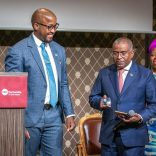Mozambique distinguished as Champion in the Fight Against Malaria
Mozambique: Youth group aids 500 families of victims in post election violence

FILE - For illustration purposes only. [File photo: CDD Moçambique]
The volunteer movement called ‘Geração 18 de Março’ (18 March Generation) assisted nearly 500 families of victims of violence during three months of post-election demonstrations in Mozambique, accompanying nearly 3,200 detainees with the support of the Mozambican Bar Association.
“It’s a generation [of activists] that knows what it’s like to feel the consequences of repression,” Mozambican activist Quitéria Guirengane explained to Lusa, one of the leaders of the movement that, since 2023, has taken on the objective of “giving substance to the struggle in favour of freedom” in Mozambique.
On the morning of 18 March 2023, a Saturday, Mozambican police officers claimed to have ‘superior orders’, which have never been clarified, to disperse, with rubber bullets and tear gas, groups of young people who intended to hold peaceful marches, announced to the municipal authorities, in various parts of the country in honour of the social intervention ‘rapper’ Azagaia, who died of illness a week earlier, dismaying thousands of fans, especially young people, in Mozambique and throughout Portuguese-speaking countries, where his name was already known.
The police repression, which took place mainly in Maputo, left people detained and several injured, and the organisers of the marches subsequently submitted appeals to national and foreign authorities for accountability for what they classify as disproportionate force exercised by the police.
The episode led to the creation of the so-called ‘18 March Generation’, a voluntary youth movement that has stood out in recent months in providing hospital, judicial and social assistance for the victims of the clashes between the police and demonstrators rejecting the results of the elections held on 9 October last year.
The network, which includes just over 20 volunteer activists, acted as a central point for reporting cases that occurred during the demonstrations, especially on social networks, in a task supported financially by anonymous people and carried out in coordination with civil society organisations, as well as the Bar Association, which assisted a considerable number of the 3,200 arrests recorded during the period.
“We realised that it was important to create a rapid response structure, even though, as a generation, we are not a formalised movement (…) This allowed us to support the acquisition of medicines, crutches, bullet removal procedures,” added the Mozambican activist.
Complaints about alleged harassment of protesters in different parts of the country forced the movement to also establish an ‘invisible network’ of health professionals who were willing to help.
“Considering that we are operating not only in a situation of serious humanitarian crisis, but also of security where some people who have been shot are afraid to go to hospitals, this also meant having this invisible network of health professionals,” she explained.
Inspired by the ideas of Azagaia, a musician who became famous for his open criticism of governance in Mozambique, the promise of this group of activists is to keep the lines of denunciation open, even at a time when, at least for the next three months, the hope of a prolonged peace has taken hold of the country, which has lived through days of chaos in recent weeks.
More than 300 people have died and over 600 have been shot in the post-election demonstrations since 21 October in Mozambique, called by presidential candidate Venâncio Mondlane – who does not recognise the results, alleging ‘electoral fraud’ – which have degenerated into violence and the destruction of public and private infrastructure.
On 23 December, Mozambique’s Constitutional Council proclaimed Daniel Chapo, the candidate supported by the ruling Front for the Liberation of Mozambique (Frelimo), the winner of the presidential election, with 65.17% of the vote, as well as the victory of Frelimo, which retained its parliamentary majority in the general elections of 9 October.
This announcement sparked chaos across the country, with pro-Mondlane demonstrators – who according to the Constitutional Council won only 24% of the vote – in the streets, barricades, looting and clashes with the police.
Last week, Mondlane demanded 25 measures from the Mozambican authorities over the next three months, threatening to resume demonstrations and street protests ‘in a more intense way’ if they are not implemented.












Leave a Reply
Be the First to Comment!
You must be logged in to post a comment.
You must be logged in to post a comment.